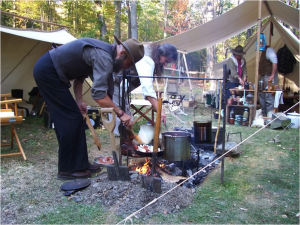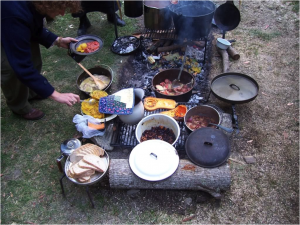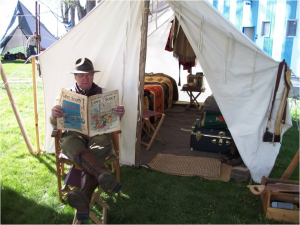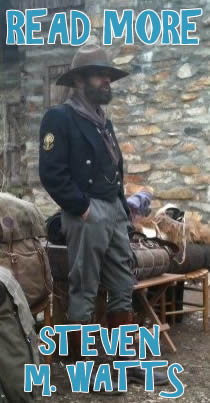“Here I am camped by a rushing river between forest-clad hills. It is close on ten in the morning. I turned out at five, and yet those five hours have been full of work for me, albeit it was no more than little camp jobs. The fire had to be lit, coffee and scones to be made. Then followed boiling and sand-scrubbing the cooking utensils; collecting of firewood for the day (both kindling and ember-forming wood); a new crossbar and pothooks had to be cut and trimmed; a pair of tongs for the fire, and a besom for cleaning the camp ground had to be cut and made. Bedding had to be aired and stowed; moccasins to be greased; the camp ground swept up and rubbish burned; the trout had to be gutted and washed. Finally, I had a shave and a bathe; and here I am ready for the day’s work whatever it may be.” – Lord Robert Baden Powell, 1911
Camp life is about the simple pleasures. It’s about elegant actions performed on a rustic stage. And, it’s about manageable tasks aimed at subsistence, efficiency and personal re-creation. In camp, the most humble of jobs are granted the worthiness they deserve. The basic needs of food, shelter, warmth and water are front and center in the camping life. Nothing goes unnoticed, and nothing seems extraneous.
The beauty of the Classic Camping style provides the backdrop for this special life in the open. Bright flannel shirts, silk scarves and Indian trade blankets are set against the muted tones of canvas, wood and metal to color the scene—while the glow of campfires, candles and lanterns softly break the darkness.
It is the perfect intersection of work and play. The outdoorsman labors in the necessary duties of camp life, and then revels in the guiltless pleasures of woods-loafing. The day’s routine is flavored by the camper’s direct contact with the natural world. A wool mackinaw greets the cool morning, a broad brimmed hat repels the sun of a warm mid-day, and the well-pitched tent provides a snug and dry retreat from an afternoon thunderstorm.
Camp life is about the small adjustments in life—loosening or tightening the tent’s guy lines, raising or lowering the tea kettle, stropping the edge of a knife or rearranging that one piece of wood in the fire for the perfect flame.
The preparation of meals, the arrangement of gear, the hauling of water and firewood are never viewed as mere chores. They are elevated to the status of “campcraft”—the means by which you live in your own chosen nomadic comfort.
And, ultimately camp life is about the heart and soul. It is evocative—hard to define, but as clear to you as an early autumn sky. When practiced with skill and passion it is simply best understood as—home.
“My comrade went in yesterday to the nearest hamlet, and will be back today with our letters and supplies. He will find me away fishing or sketching, and gathering berries for our sweet of stewed fruit at dinner; but he will find the camp swept and garnished, fire laid ready to be lit, cooking pots, cups, and plates all ready and clean for his use, and food handy. All the succession of very little jobs, but which in their sum are important. They all give enjoyment and satisfaction…they bring delight, experience, resourcefulness, self-reliance, thought for others, and the excellent discipline of camp-tradition.” – Lord Robert Baden Powell, 1911
Steve Watts directs the Aboriginal Studies Program and the Traditional Outdoor Skills Program at the Schiele Museum of Natural History in Gastonia, North Carolina. Watts is the author of Practicing Primitive: A Handbook of Aboriginal Skills, Gibbs Smith Publishers, 2004











No intelligent comments yet. Please leave one of your own!